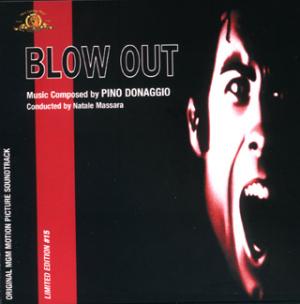************************************************************** EDITOR’s RECOMMENDATION February 2003 **************************************************************
low Out
BMusic composed by Pino Donaggio
Available from Prometheus Records PCR 515 (limited edition of 2500)
Running time: 51.18
May be purchased from buysoundtrax.com.

Whatever one may think of the films of Brian De Palma, few would deny he knows the value of a fine music score, soliciting great late career work from Bernard Herrmann for Sisters (1973) and Obsession (1976) and one of John Williams' very best scores for The Fury (1978). During this same period De Palma forged a collaboration with composer Pino Donaggio which endured through Carrie (1976), Home Movies (1979), Dressed to Kill (1980), Blow Out (1981), Body Double (1984) and Raising Cain (1992).
Donaggio, a Venetian composer who made his film scoring debut with Nicholas Roeg's Venice set masterpiece Don't Look Now (1973), has written the music for over 130 film and TV projects. Yet in English speaking territories he remains little known beyond his collaboration with De Palma, the vast majority of his work being for Italian films, many of them in the horror genre, including several with Dario Argento. Those who are familiar with Donaggio's Don't Look Now - still the finest film he has scored - will have some idea of what to expect here. The lovely, ineffably sad main theme is a close cousin to that from the composer's debut feature, filled with the same sense of mourning and predestined loss. With flute to the fore in the more lyrical moments Blow Out is again in similar territory to Don't Look Now, and also to Carrie, De Palma's superb setting of Stephen King's first novel. Again like Don't Look Now music for much of the rest of the score consists of dark, suspenseful atmospherics; and should you think I am pushing the comparison too far, both movies are sophisticated thrillers and love stories which climax with the tragic death of one of the lovers, so it is perhaps inevitable that the same composer would bring similar stylistic devices to each.
In the suspense, action category, "Burke to Phone Booth / Burke Kills Hooker" is a particularly effective set-piece of growing terror and desperation, while the brief, harp infused "Sally to Station" particularly evokes Donaggio's music for an Autumnal Venice. "Burke Meets Sally / The Station" and the following confrontation music develops considerable power from relentless piano and military snare, while the final action is underscored with heartrending lyricism, not blood and thunder.
The bitingly ironic epilogue, the music for which is entitled "Good Scream / End Credits" is in the film both heartrending and chilling, the music alone a wonderfully dark romantic adagio for strings and piano.
The album also contains two short cues not used in the final cut and two source cues, a soft jazz-rock instrumental and a disco number, the latter used for the opening film-within-a-film and something of a parody of rock band Goblin's work for the films of Dario Argento.
Essential for De Palma and Donaggio fans, and an outstanding thriller score with some unforgettable doomed romanticism for everyone else.
Gary S Dalkin
4
Return to Index